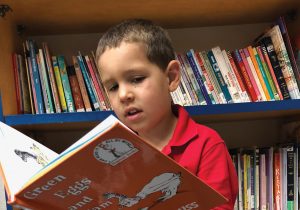 You know this feeling. You have felt it before.
You know this feeling. You have felt it before.
You may not have been aware of it when it was happening. In fact, as soon as you are, you lose it. But everyone has experienced this magic in their lives, and it is every writer’s purpose to gift it to you.
I am talking of course about losing yourself in a story, loving reading so much that you lose yourself — reading so fluently that you are not even reading anymore. Your imagination has taken over. You are in a world created, and accessible, only by you and the author.
Jumping into a book and landing inside Hogwarts or Tolkien’s Middle Earth, through the written word, is not a natural ability. Fluently sailing through pages like Odysseus, through Poseidon’s waters, requires three basic elements: accuracy, proper speed, and meaningful expression.
Accuracy requires accurate automaticity. Automaticity is a word I threw in here to test your reading fluency. Only joking, but this word, with almost more syllables than letters, refers to the ability to recognize words automatically, without having to consciously decode (or process) them.
These skills are best developed progressively. First, children learn to read words alone, later putting words into meaningful phrases. Phrases become sentences and sentences become stories. Stories become memories.
Reading fluency also requires a proper reading speed — too slow and the text’s meaning will be lost; too fast and its meaning will be skipped over. Please note that an adult’s reading speed is usually settled by the time the individual is in sixth grade.
The last aspect of reading fluency is meaningful expression. Fluency relates inherently to reading comprehension. Reading is not a stimulus-response mechanism where input is the word and output is its meaning. Reading should be a sum greater than its parts. It should create worlds, emotions, triumphs and tribulations.
To able to read with meaningful expression, there are few proven strategies.
Modeling, by teachers, peers, and audio-assists, are all helpful ways to improve reading fluency. Modeling provides children with word recognition strategies and it demonstrates correct phrasing and prosody. For instance, one strategy called the neurological impress method asks a proficient reader to read at the rate of the struggling reader. Since the slower rate is a familiar speed, the brain can then learn new words and clarify difficult words.
Repeated reading is also an immensely effective strategy. A famous study from the 1970s demonstrated that when students read passages over and over, the reading rate improved as well as the comprehension rate. Often, increased reading rates lower comprehension, but when the passage was repeated, the two were directly correlated.
Reading fluently allows us to wander through the minds of authors, exploring the full range of human experience. We mature, we improve, we love and live. The only question left unanswered by reading fluency is: where do we go next?
Self Development Academy is now enrolling for the 2020-2021 school year. Self Development Academy Mesa has scheduled kindergarten information nights for parents on Oct. 3 and Nov. 7 at 6:15 p.m. Open enrollment begins Nov. 1 for the following year. You may submit your registration information at this time.
To find out more about Self Development Academy, please call (480) 641-2640, or visit our website: www.selfdevelopmentacademy.com.

